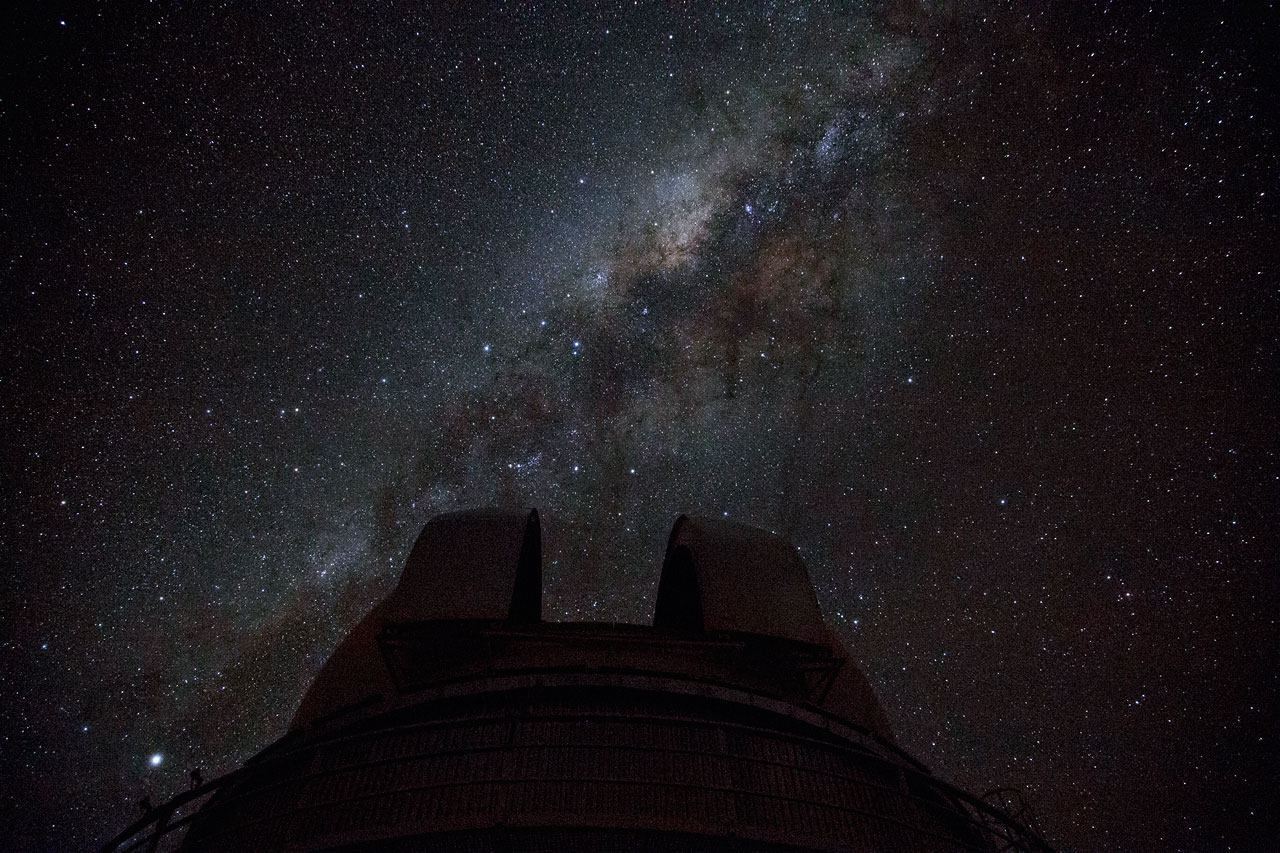ESO and the United Nations’ Sustainable Development Goals
The aims of the United Nations’ Sustainable Development Goals (UN SDGs) are to eradicate poverty, improve human lives, protect the environment, and ensure peace and justice, leading to a more sustainable future for all. These goals require all countries and stakeholders to work together to implement strategies that improve health and education, reduce inequality, address climate change and spur economic growth.
With 16 Member States across Europe, along with the host and partner state of Chile and with Australia as a strategic partner, the European Southern Observatory (ESO) supports the achievement of the UN SDGs in their three different dimensions: economy, society and environment. Through ESO’s mission to design, build and operate observational facilities that help advance our knowledge of the Universe, and to foster international cooperation for astronomy, ESO has a role to play in achieving the goals and targets set by the UN by being a driver for scientific research and by supporting educational activities at all levels in a sustainable way.
How does ESO contribute to tackling the UN SDGs?
There are 17 Sustainable Development Goals, which are described in full on a dedicated UN website. The goals that ESO contributes to are related to improving quality in education, striving for diversity, equity and inclusion within educational, science and engineering settings, goals related to technology, innovation, peaceful scientific cooperation, as well as environment and sustainability. Click on one of the coloured symbols to read more about examples of ESO initiatives and actions that contribute to that development goal in particular.
 |
 |
 |
 |
 |
 |
 |
 |
 |
 |
 |
 |
 |
 |
 |
 |
 |

Good Health and Well-being (SDG 3)
ESO contributes to the third SDG, Good Health and Well-being, through its advocacy for preserving the dark night skies and by enabling the development of technology that can be used in medical applications.
Dark and quiet skies protection
Preserving the darkness of the skies goes beyond astronomical research. There is a wealth of scientific literature studying the impacts on light-polluted skies on human health. For instance, the 2017 Nobel Prize of Medicine or Physiology, was given to individuals whose discoveries suggest that the human body clock requires natural daylight rhythms and dark skies to function properly. Artificial light has been linked to low levels of human melatonin, which might lead to health risks. Moreover, scientific studies suggest that artificial light increases the risk of depression, sleep disorders, obesity and cancer.
Further, the dark night sky is a source of awe, education, outreach and community, with stargazing having the potential to promote health and wellness in society. Stargazing has shown to offer benefits to the human well-being by nourishing positive emotions and connectedness with nature. By actively advocating for the protection of the dark sky, ESO, in collaboration with other observatories and the Chilean government, is making its own small contribution to healthy lives across the planet.
Read more about the topic and ESO’s initiatives under the Dark and quiet skies preservation page.
Medical applications
Through the EU-funded ATTRACT initiative, the German institute innoFSPEC, is transferring the astronomical technology from the MUSE integral field spectrograph on ESO’s Very Large Telescope, into cancer diagnostics tools.

Education (SDG 4)
ESO plays a pivotal role in training early-career astronomers, astrophysicists, engineers and communicators of science from across the world. Training is done through a broad range of programmes and initiatives, such as studentships, fellowships, internships and summer research programmes. In the last decade, ESO has trained over 260 students in science and engineering from more than 40 countries. Over 90 interns in science communication, graphic design, astronomy, engineering and administration, and hosted over 150 postdoctoral fellows in astronomy and engineering from more than 30 countries.
Through the ESO Supernova Planetarium & Visitor Centre, located in Garching, Germany, ESO promotes and increases scientific literacy in society and inspires children and aspiring youths to engage in science, technology, engineering and mathematics (STEM). The facility hosts a planetarium and 2200m2 exhibition space. Visitors can participate in planetarium shows, guided tours, hands-on educational workshops (for school classes) and a range of other cultural and scientific events. Since opening in spring 2018, the centre welcomes around 70000 people each year. Of those visitors, approximately 50000 watch a planetarium show, each show containing a live component encouraging and enabling visitors to explore the night-sky themselves. The extensive interactive exhibition is free of charge to visit and it is estimated that a further ca. 20000 visitors per year come solely to explore it. Ticket prices of all activities in the ESO Supernova are kept as low as possible to ensure inclusive education and promote lifelong learning for all.
The education programme of the ESO Supernova is offered completely free of charge and available to all compulsory stages of education, from Kindergarten through to end of secondary education. Within the total annual visitor numbers, over 9000 of those are school pupils and their teachers, typically coming from more than seven different countries each year, engaging with at least part of the education programme. A further 350 teachers and educators are engaged annually in professional development activities.
ESO also supports other organisations in their astronomy education endeavours by providing open source materials, enabling facilities around the world to share the fascination of astronomy with as varied an audience as possible.
In Chile, where our observatories are located, ESO funds post-doctoral programmes in astronomy at Chilean academic institutions and provides studentships at the ESO offices in Santiago for students enrolled in Chilean universities. After participating in these training programmes, these young professionals are well-equipped with a relevant set of transferable skills, such as in data science, programming, and/or machine learning. This makes it possible for them to transition on to careers in areas like space exploration, engineering, operations, information technology, education, business development, programme and project management, and media and communications.
Furthermore, ESO also promotes quality education through making the observations conducted with its telescopes public. The petabyte-sized ESO Science Archive contains open data from ESO telescopes, which can be used for research, education or outreach purposes. ESO also has an extensive database of images and videos. By making these materials available for free, ESO ensures that audiences everywhere, from teachers to children, can experience the wonders of the cosmos.


Closing the Gender and Inequality Gap
(SDGs 5, 10)
ESO is committed to equity, diversity and inclusion and believes that astronomical education and research can be a tool to empower and inspire women around the world and bring people of different backgrounds together in collaborations.
The ESO Diversity & Inclusion Committee advises ESO’s management on goals, policies and good practices pertaining to all aspects of diversity. Outside of ESO, the organisation is a member of the network GENERA (Gender Equality Network in Physics in the European Research Area), fostering global collaboration in gender equality policy in physics between research organisations, associations and consortia. More information about the Committee’s work, and in general about ESO’s Diversity, Equity and Inclusion activities, will be available shortly under a dedicated page.
Initiatives in Chile
A memorandum of understanding between ESO and UN Women was signed in 2020 with the goal of assessing the gender gap in STEM careers, focusing on creating training opportunities for women, particularly in the Antofagasta region in Chile. Antofagasta is the closest hub to ESO’s Paranal Observatory, and the city hosts ESO support offices.
Under the framework of this agreement, ESO has participated in the Second Chance Programme (Tu Oportunidad) by training a group of women at Paranal in key astronomical technology skills, such as coating of large telescope mirrors, allowing them to expand their job opportunities.
In addition, members of ESO staff partake in LIQCAU: + Mujeres en Ingeniería, a mentoring project led by the Universities of Antofagasta.


Economy, Technology and Innovation (SDG 8, 9)
ESO invests in engineering, science and innovation by designing and developing advanced telescopes and state-of-the-art instruments. These new technologies include astronomical technology in optics, engineering and intercontinental data transfer, medicine and imaging, sensor and detector technology.
As an example, ESO staff developed active optics, a key technology that allowed ESO — and other observatories — to build bigger and optically accurate primary mirrors for its telescopes. ESO’s contributions were also indispensable in developing systems and technology for adaptive optics, a technique that allows ground-based observatories to build telescopes able to obtain extremely sharp images by using deformable mirrors, lasers and sensors to correct for the blur caused by Earth’s atmosphere.
As a forefront organisation for astronomical technology, ESO generates new market and job opportunities, industrial collaborations, as well as contributing economically to society. As presented in the dedicated report ESO’s Benefits to Society, the economic impact by ESO can take place in different forms: from direct industrial return to suppliers, economic and innovation effects, to improved expertise and the creation of new jobs and multiplier effects in individual countries. For instance, for ESO’s upcoming Extremely Large Telescope (ELT), over 80% of the €1.3 billion development construction budget is being invested in contracts with the industry. These contracts are primarily distributed across ESO’s Member States, providing significant industrial return to these countries, creating new jobs, and promoting the emergence of new technologies and expertise.
Open data for Open Science
ESO has driven the development of open data standards in astronomy and ethical review processes in science, and contributes to the concept of a European Open Science Cloud, an initiative on open access scientific data. ESO itself has a long tradition in this area by providing data processing tools and by developing and operating science archives with the data from its various telescopes in Chile, which is open.
|





|
Climate, Environment, Sustainability, Clean Energy and Life on Earth (SDGs 7, 11, 12, 13, 15)
ESO’s work, while providing astronomers with the best tools to enable key scientific discoveries and benefiting society in many ways, places significant demands on the environment and resources. Thus, ESO strives to reduce its carbon footprint and environmental impact.
One of the key ways in which ESO is mitigating its impact on the environment is through running its observatory sites on renewable energy. The observing facilities at ESO’s La Silla and Paranal in Chile are powered by clean, renewable energy coming from photovoltaic plants built near the observatories. The goal is to have 100% of operations at the sites covered by these power plants. All the renewable energy not used for scientific operations is injected into the Chilean energy grid.
The Paranal photovoltaic power plant will also supply energy to ESO’s upcoming Extremely Large Telescope (ELT). After its inauguration, the plant became the largest solar complex in Chile supplying renewable energy to an astronomical observatory.
ESO is committed to reducing the environmental damage of long-distance travel by making extensive use of video conferencing facilities, saving up to 800 tonnes of CO2 equivalent per year. On-site, ESO is gradually replacing its fleet of vehicles by electric cars and aims to have no fossil fuels across all ESO’s sites. Read more about ESO’s environmental initiatives on the dedicated page Environmental sustainability at ESO.
Another way in which ESO contributes to an environmentally sustainable planet is through its initiatives to preserve the dark night skies. For example, there is substantial evidence of lit night skies having a negative impact on wildlife or contributing to increasing a region’s climate footprint. Read more about the topic of light pollution and ESO’s initiatives and actions under the Dark and quiet skies preservation page.


Peaceful Scientific Cooperation (SDGs 16, 17)
Bringing experts together has been key for ESO since its founding in 1962, with the goal of enabling major scientific discoveries by constructing and operating powerful observational facilities and maintaining close international collaborations.
ESO offers a platform for international collaboration and science diplomacy that actively encourages political and cultural understanding between different nations. It brings countries together to create the scientific, technical and political capacity needed to develop ambitious technical projects that allow nations to further knowledge about our Universe, spur innovation, and raise society’s awareness about the cosmos.
Given ESO's position as a centre of gravity for European astronomy, ESO is firmly embedded in, and has an impact on, European science policy. ESO is a founding member of the European Intergovernmental Research Organisations forum (EIROForum) that brings together eight of Europe’s largest research organisations with extensive expertise in the areas of basic research and the management of large, international infrastructures, facilities and research programmes. The mission of EIROForum is to combine the resources, facilities and expertise of its member organisations to support European science in reaching its full potential, both in their technical and scientific areas, as well as in diversity, equity and inclusion-related issues and challenges.
Furthermore, ESO has a permanent seat on the UN’s Committee on the Peaceful Uses of Outer Space and has made key policy contributions in assessing the impact of satellite mega-constellations, safeguarding the dark sky, and protecting the Earth from asteroids. As for the latter, ESO is a member of the UN-mandated International Asteroid Warning Network, which is a global collaboration that monitors the skies for potentially threatening asteroids.










